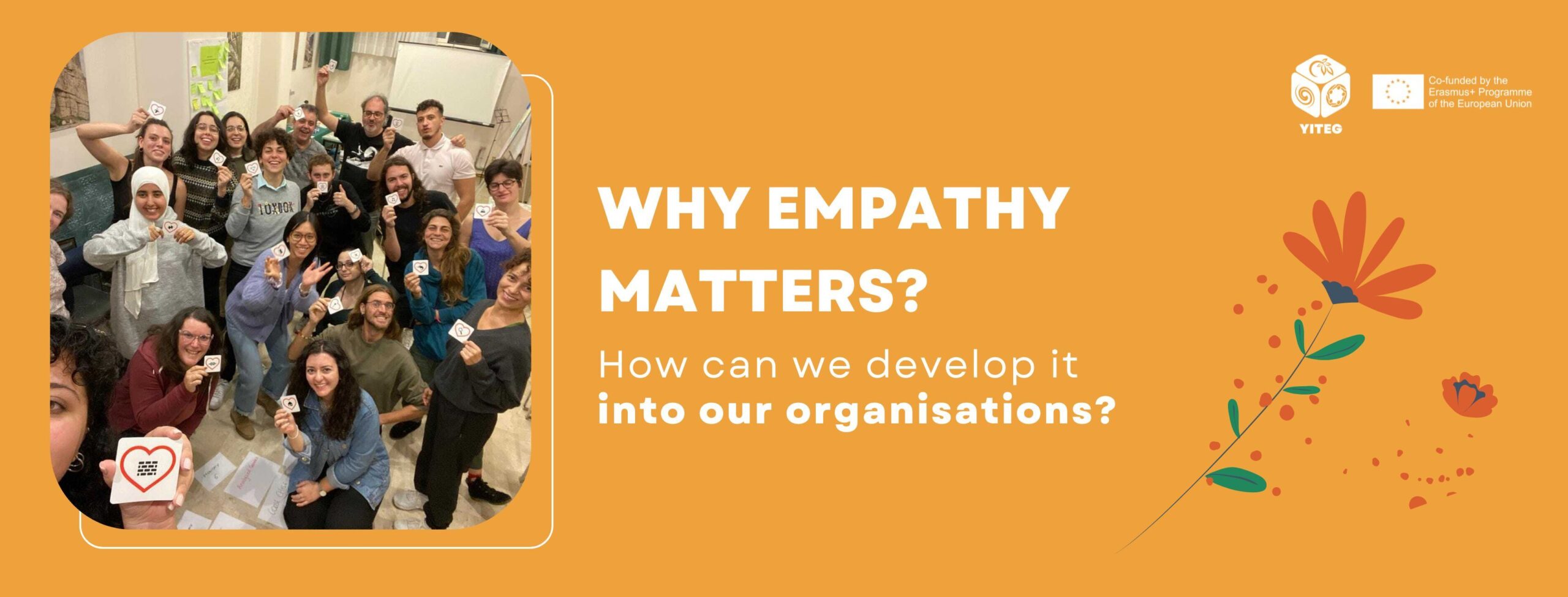Why Empathy matters as we build the road towards positive social transformation
& How can we develop it into our organisations?
As we dream, plan and create tools for social transformation, it is important to respect all beings and nature and pay attention to the value of relationships between all members of our organisations.
Only then, they will feel acknowledged, appreciated and therefore participate and work with commitment, resilience and passion.
How do they feel? How are things at home? Do they enjoy their work? Is their work fulfilling? Are they physically and psychologically healthy? Do they have fun and smile in life?
When we work together, it is important to set up a common goal and be effective in achieving it…but it is also important for our wellbeing and happiness to enjoy the process of making it happen.
Let’s develop a culture of care into our organisations
The Culture of Care is an integrated, humane approach to empathy and emotional intelligence in action. It represents values that are vital to us. In essence, we add another dimension to the pure rationality on which today’s society is based.
The Culture of Care is a process that gives everyone the space to exist and act freely within well-established boundaries regardless of factors such as nationality, culture, religion, spirituality, political and sexual positioning, etc. Taking care of others means respecting these boundaries and supporting their establishment. The Culture of Care facilitates and implements the above by creating the idea of a social space where we can share emotions, obstacles and difficulties.
Some processes that can foster Culture of Care are:
- We can start a meeting with a check in and finish it with a check out. How do we feel now? Is there any struggle we want to share or any help we need?
- When we deal with personal or collective problems that we want to share with the group, we can call for a heart circle. During the heart circle, we all come with open hearts to listen and not judge. It is a safe place to share any emotional blockages or difficulties in a non-violent way. The circle actively listens and is there to support and give advice, feedback or guidance if we need it.
- When difficult conflicts arise, we can arrange a session of mediation.
- When we want to build stronger relationships amongst all members of the group, we can organise bonding sessions or bonding weekends.
It’s critical for our organisations -all its members- to be empowered and able to communicate in an effective way, so that they can all move their organization forward during both good and challenging times. That requires looking beyond traditional strategies for management development, and cultivating the skills most important for all member’s wellbeing.
One of those skills is empathy — a vital competency and one of the most important ingredients to create a better world, society and a civilization that we can be proud of.
Empathetic behaviour means having the ability to understand the needs of others, and being aware of their feelings and thoughts. Unfortunately, it has long been a soft skill that’s overlooked as a performance indicator. Our experience, however, has shown that today’s successful organisations must be more “person-focused” and able to work well with people from varying teams, countries, cultures, and backgrounds.
The ability to be compassionate and connect with others is critical to our lives, both personally and professionally. Demonstrating empathy is a key part of emotional intelligence and effectiveness, as it improves human interactions and can lead to more effective communication and positive outcomes, in both work, home and community settings. Empathy is the ability to observe, perceive and relate to the thoughts, emotions, or experiences of others.
It’s important to remember the difference between sympathy and empathy, as the 2 are often confused.
- Sympathy is typically defined by feelings of pity for another person, without really understanding what it’s like to be in their situation.
- Empathy, on the other hand, refers to the capacity or ability to imagine oneself in the situation of another, experiencing the emotions, ideas, or opinions of that person.
How can we cultivate empathy inside our organisations?
- Develop our listening skills.
In order to really understand others, it is important to be good listeners, skilled in the Active Listening technique. When people are being heard, then they feel respected, and critical trust on the team can grow. To show the highest levels of empathy, we should focus on listening to hear the meaning behind what others are saying by paying attention to not only the words being said, but also to their feelings, needs, gestures and body language.
- Watch out for signs of burnout in others.
Work burnout is a big problem nowadays, and it comes at greater risk during times of intense stress and pressure. Many people are stressed, putting in more work hours than ever before and finding it difficult to separate work and home life.
It is important to be able to recognize signs of overwork in others before burnout becomes an issue that results in disengagement or turnover. This might mean taking a few extra minutes each week to check in with team members and help them to recover from overwork. - Show sincere interest in the needs, hopes, and dreams of other people.
Part of cooperating with empathy involves working to understand the unique needs and goals of each team member and how to best match work assignments to contribute to both performance and team member’s satisfaction. Team members who see that are recognised and heard, are more engaged and willing to work with commitment and passion. - Develop our Non-Violent Communication skills through training and workshops
Nonviolent Communication (NVC) is an approach to enhance communication, understanding, and connection based on the principles of nonviolence and humanistic psychology. It is not an attempt to end disagreements, but rather a way that aims to increase empathy and understanding to improve the overall quality of life. It seeks empathic dialogue and understanding among all parties their different kinds of interests. Nonviolent Communication evolved from concepts used in person-centered therapy, and was developed by clinical psychologist Marshall Rosenberg beginning in the 1960s and 1970s.
The idea is that once people hear one another, it will be much easier to talk about a solution which satisfies all parties’ fundamental needs. The goal is interpersonal harmony and obtaining knowledge for future cooperation. Notable concepts include rejecting coercive forms of discourse, gathering facts through observing without evaluating, genuinely and concretely expressing feelings and needs, and formulating effective and empathetic requests. Nonviolent communication is offered in workshops for the general public, particularly with regards to seeking harmony in relationships and at workplaces.
- Demonstrate a willingness to help a colleague with personal problems.
Very often lines between work and personal life are becoming increasingly blurred. In an empathetic working environment, we understand that all team members are dynamic individuals who are shouldering personal problems while having to maintain their professional responsibilities.
Keeping open lines of communication and encouraging transparency is a good way to foster psychological safety among the group and help team members feel comfortable sharing when it’s necessary.
- Show compassion when other people disclose a personal loss
We’ve all been through personal loss, so even if we can’t relate to the specific loss our team member experiences, we can act empathetically and let them know they’re supported. - Work in a multi-cultural environment
It is about our ability to collaborate across boundaries in global or cross-cultural organizations. Working in a multicultural team requires cultural intelligence and the ability to understand people who have very different perspectives and experiences.When we own our empathetic skills, we improve our effectiveness and increase our chances of success. Empathetic team members are assets to organizations, in part because they are able to effectively build and maintain relationships and retain talent.
- Encourage genuine perspective-taking.
We should consistently put ourselves in the other person’s place. For members of our organisations, this includes taking into account the personal lived experiences or perspectives of everyone. It also can be applied to solving problems, managing conflicts, or driving innovation. It’s very helpful to understand the role social identity plays for both ourselves and others.
Empathy is particularly an imperative for effective organizational diversity initiatives.
- Cultivate compassion
We can do this by supporting members of our organisations who care about how others feel, and considering the effects that operational decisions have on team members, employees, customers, and communities. Go beyond the standard-issue values statement and allow time for compassionate reflection and response.
By doing as many as we can from the above, we will manage to build strong organisations that consist of happy, effective, creative and committed members. Organisations that promote empathy, kindness, respect, collective processes, acknowledgment of achievements, wellbeing at work, are those organisations that will be part of the transformative economies, where people are not just machines of production and results…but colourful flowers of emotions and innovative creation.

